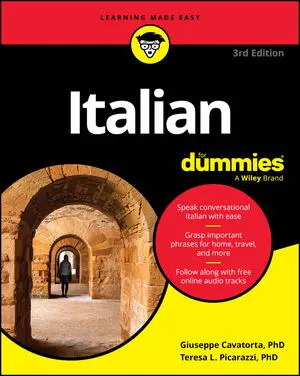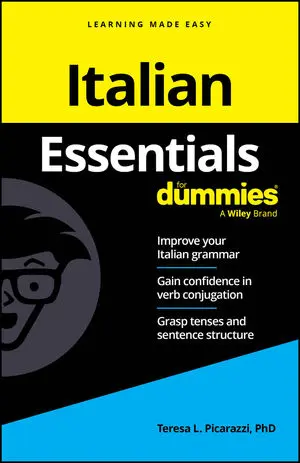Planning a trip to Italy? Learn some basic Italian to make it more fulfilling. Get to know Italian greetings, question words, numbers, and the days of the week. Also, be sure to know how to ask for help in Italian so you're prepared for emergencies. And something very important: how to order food and drinks! This Cheat Sheet includes some useful phrases you can use every day as well as some phrases for dealing with an emergency and ordering food and drink.
How to say hello in Italian and other common Italian greetings
Knowing Italian greetings can make a good impression, whether you’re speaking Italian for business or while traveling. The Italian culture places importance on introductions and salutations as they are often considered a foundational way of showing respect.
There are different expressions you can use depending on whether the situation is formal (business meeting) or informal (meeting someone at a restaurant). Offer polite greetings to friends and associates or as a way to break the ice when meeting new people.
Practice using these common Italian greetings:
- Buongiorno! (bwohn-johr-noh) (Hello! and Good morning!)
- Arrivederci! (ahr-ree-veh-dehr-chee) (Goodbye!) (Formal)
- Ciao! (chou) (Hello! and Good-bye!) (Informal)
- Salve! (sahl-veh) (Hello! and Good-bye!) (Neutral)
- Buonasera! (bwoh-nah-seh-rah) (Good afternoon! Good evening!) (Formal)
- Buonanotte! (bwoh-nah-noht-teh) (Good night!) (Informal)
- Come si chiama? (koh-meh see kyah-mah) (What is your name?) (Formal)
- Come ti chiami? (koh-meh tee kyah-mee) (What is your name?) (Informal)
- Mi chiamo…(mee kyah-moh) (My name is. . .)
- Come sta? (koh-meh stah) (How are you?) (Formal)
- Come stai? (koh-meh stahy) (How are you?) (Informal)
- Bene, grazie. (beh-neh grah-tsee-eh) (Fine, thank you.)
How to say please and thank you in Italian and other Italian courtesy phrases
Courtesy is important no matter what country you’re in. Use these courtesy phrases when speaking in Italian so you can be considerate and polite; they’ll also help you communicate easily:
- Per favore (pehr fah-voh-reh) (Please.)
- Per piacere (pehr pyah-cheh-reh) (Please.)
- Grazie (grah-tsee-eh) (Thank you.)
- Prego! (preh-goh) (You’re welcome!; By all means, after you.)
- Non c’è di che. (nohn cheh dee keh) (You’re welcome.)
- Mi dispiace. (mee dees-pyah-cheh) (I’m sorry.)
- Mi scusi. (mee skooh-zee) (Excuse me, formal.)
- Scusi, un informazione, per favore. (skooh-zee oohn-een-fohr-mats-yoh-neh pehr fah-voh-reh) (Excuse me, I need some information, please.)
- Scusa. (skooh-zah) (Excuse me, I’m sorry, informal)
- Permesso? (pehr-mehs-soh) (Excuse me — when walking through a crowded train compartment; also, “May I come in?” when crossing the threshold of someone’s house.)
Basic question words in Italian
To communicate in Italian and to travel with ease, there are practical questions in Italian (or any language for that matter) that you’ll use daily and have to know:
- Parla inglese? (pahr-lah een-gleh-zeh) (Do you speak English?)
- Sì. (see) (Yes.)
- No. (noh) (No.)
- Chi? (kee) (Who?)
- Cosa? (koh-sah) (What?)
- Quando? (kwahn-doh) (When?)
- Dove? (doh-veh) (Where?)
- Perché? (pehr-keh) (Why?)
- Come? (koh-meh) (How?)
- Quanto? (kwanh-toh) (How much?)
Try these helpful phrases:
- Dov’è la stazione? (doh-veh lah stah-tsyoh-neh) (Where is the station?)
- Scusi, dov’è il bagno? (skooh-zee doh-veh eel bahn-yoh) (Where is the bathroom?)
- Quanto dista il Colosseo? (kwahn-toh dees-tah eel koh-lohs-seh-oh) (How far is the Coloseum?)
- Dove si mangia il miglior gelato? (doh-veh see mahn-jah eel meel-yohr geh-lah-toh) (Where can you get the best ice cream?)
- Come si arriva in Piazza della Repubblica? (koh-meh see ahr-ree-vah een pyahts-sah dehl-lah reh-pooh-blee-kah) (How do you get to Piazza della Repubblica?)
How to get help for emergencies in Italian
If you have an emergency while traveling in Italy, you’ll be glad to know these basic Italian phrases. Be prepared for emergencies by committing these Italian phrases to memory:
- Aiuto! (ah-yooh-toh) (Help!)
- Emergenza! (eh-mehr-jehn-tsah) (Emergency!)
- Chiamate la polizia! (chee-ah-mah-teh lah poh-lee-tsee-ah) (Call the police!)
- Chiamate un’ambulanza! (kee-ah-mah-teh ooh-nahm-booh-lahn-tsah) (Call an ambulance!)
- Ho bisogno di un medico. (oh bee-zoh-nyoh dee oohn meh-dee-koh) (I need a doctor.)
- Dov’è l’ospedale? (doh-veh lohs-peh-dah-leh) (Where is the hospital?)
- Mi sento molto male. (mee sehn-toh mohl-toh mah-leh) (I feel very sick.)
How to ordering food and drink in Italian
If you visit Italy without trying some of the food, you haven’t really visited Italy. (You’re also probably rather hungry.) The following phrases can come in handy whether you need a bottle of water or you’re ordering a lavish Italian dinner:
- Un cappucccino, per favore. (oohn kahp-pooh-chee-noh pehr fah-voh-reh) (A cappuccino, please.)
- Un bicchiere di acqua minerale per favore. (oohn bee-kyeh-reh dee ahk-wah meen-eh-rah-leh perh fah-voh-reh). (A glass of mineral water, please.)
- Mezzo litro d’acqua. (mehdz-zoh lee-troh dahk-wah) (Half a liter of water.) (Generally, you would take this to go, not standing at the bar)
- Mezzo chilo di pesche, per piacere. (mehdz-zoh kee-loh dee pehs-keh perh pyah-cheh-reh) (Half a kilo of peaches, please.)
- Quanto viene? (kwahn-toh vyeh-neh) (How much does it come to?)
- Un gelato di 2 euro, per favore. (oohn geh-lah-toh dee dooh-eh eh-ooh-roh pehr fah-voh-reh) (A 2-Euro size ice cream, please.)
- Quali gusti? (kwah-lee goohs-tee) (What flavors?)
- Ci fa il conto, per favore?/Ci porta il conto? (chee fah eel kohn-toh pehr fah-voh-reh/chee pohr-tah eel kohn-toh) (Will you bring us the bill please?)
Ten phrases so people think you’re Italian
Here are ten sophisticated phrases to make you sound even more Italian — these are truly idiomatic expressions. Using these expressions may make an Italian believe you’re one of them. Have fun!
- In bocca al lupo! Perhaps you have an Italian friend facing a difficult situation and you want to wish them good luck. The literal translation buona fortuna! (bwoh-nah fohr-tooh-nah) could work, but we think that this phrase makes you sound really Italian: inbocca al lupo! (een bohk-kah ahl looh-poh). Literally, this means “in the wolf’s mouth!” The upcoming task looks like a big wolf, waiting with its mouth wide open. Your friend will probably answer Crepi il lupo! (kreh-pee eel looh-poh), which means “May the wolf die!”
- Mica male! Use mica male! (mee-cah mah-leh) to express a positive opinion about something, often when that positive opinion comes as a surprise. If, for example, you want to say that balsamic vinegar tastes good on strawberries and that came as a surprise, you can say: Mica male l’aceto balsamico sulle fragole! (mee-cah mah-leh lah-cheh-toh bahl-sah-mee-koh sool-leh frah-goh-leh). It corresponds to the English “not too bad.” “Mica” is often used to reinforce a negation, mainly in informal contexts.
- Salute! Someone sneezes and you say salute! (sah-looh-teh), which means “health.” In fact, it’s a way to wish the person to be healthy soon. The English equivalent is “Bless you!” You can also say salute! when making a toast.
- Italians love to talk, no doubt about it. Nevertheless, at times one word says it all. One good example is macché! (mahk-keh). It’s a strong and determined way to say “Of course not” or “Certainly not!”
- Neanche per sogno! Similar to the previous idiom, neanche per sogno (neh-ahn-keh pehr soh-nyoh) means literally “not even in a dream.” It’s another way to say “No way!” and is close to the English expression “In your dreams.”
- Peggio per te! You don’t show much sympathy when saying this phrase to someone, but if you’re looking for the Italian equivalent of “Too bad for you!” or “Tough luck!” Peggio per te (pehj-joh pehr teh) is what you’d say.
- Piantala! (pyahn-tah-lah) is an informal way to say, “Stop it!” or “Cut it out!” It works wonders when you want someone to stop hassling you for money, or anything else, in the streets.
- Vacci piano! “Slow down!” is the translation of this Italian expression vacci piano! (vahch-chee pyah-noh). Use it when you feel that somebody is going too fast or being too enthusiastic about something.
- Tanto per cambiare! (tahn-toh pehr cahm-byah-reh) is a phrase you can use either literally — when someone does something they don’t normally do — or sarcastically, when they’re doing the same thing they always do. For example, if you have pasta for lunch every day, you might say, “Tanto per cambiare!” with a bit of sarcasm to let people know it’s time to have something different.
- Lascia perdere! Say something is really bugging your new Italian friend. A quick “Lascia perdere!” (lah-shah pehr-deh-reh) (Let it go! Forget about it!) will help put things into a new light. Didn’t get the 5 percent discount you were promised? Lascia perdere!






